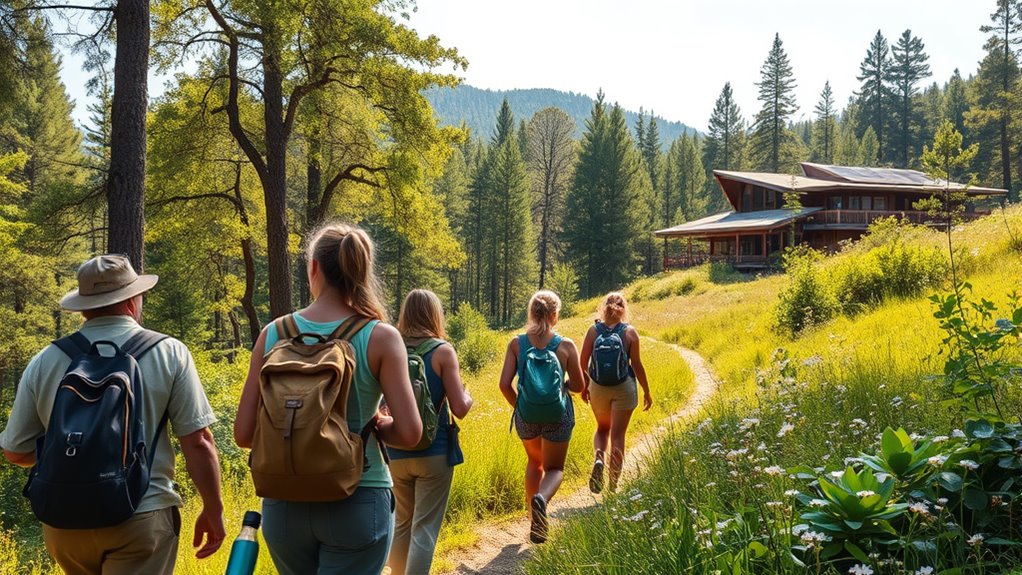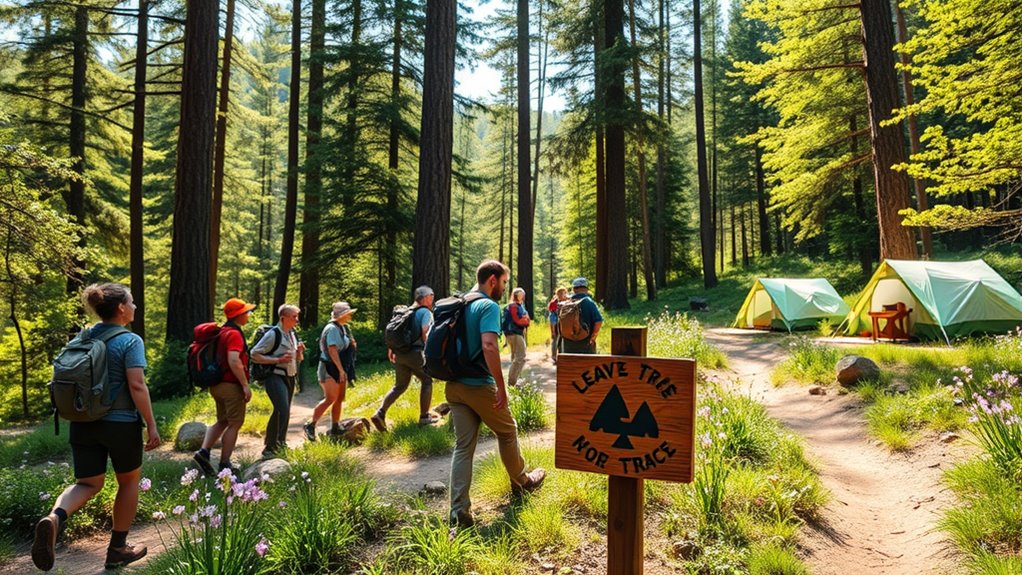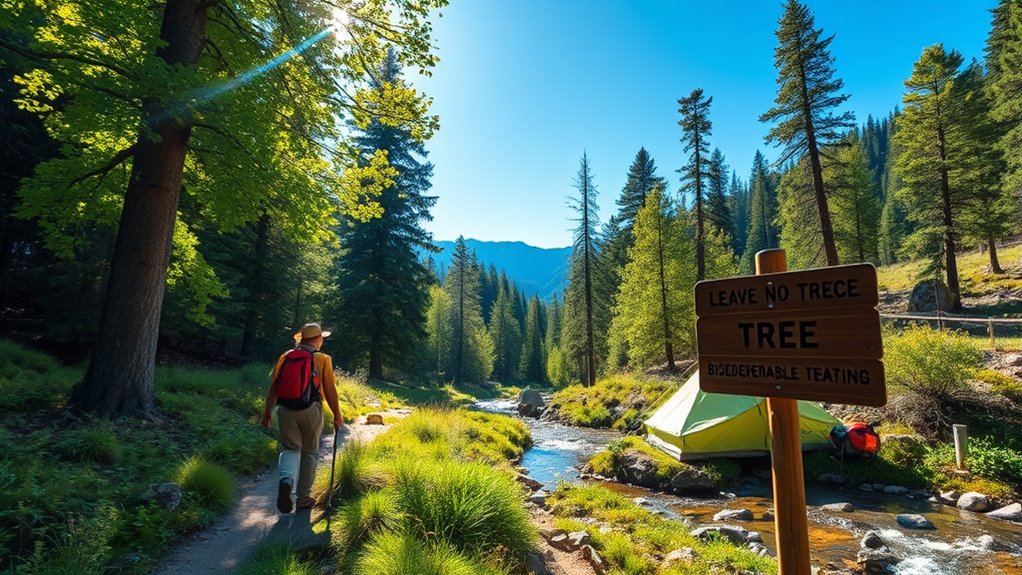To travel sustainably, choose eco-friendly accommodations that use renewable energy and local businesses that support community development. Use responsible transportation options like biking, walking, or public transit to cut emissions. Respect local cultures, traditions, and wildlife by engaging thoughtfully and avoiding disturbance. Reduce waste by carrying reusable items and supporting low-impact activities. Following these practices helps you minimize your environmental footprint and fosters meaningful connections—if you want to discover more, keep exploring how you can travel eco-consciously.
Key Takeaways
- Choose accommodations that use renewable energy, water-saving systems, and eco-friendly materials to minimize environmental impact.
- Opt for sustainable transportation like electric vehicles, biking, walking, or public transit to reduce emissions.
- Support local communities by shopping at markets, dining locally, and engaging with cultural initiatives.
- Reduce waste by bringing reusable containers, refusing plastics, and participating in low-impact activities.
- Respect local cultures and wildlife, follow guidelines, and promote conservation efforts for responsible tourism.
Choosing Eco-Friendly Accommodations

When selecting accommodations for your eco-friendly trip, look for places that prioritize sustainability. Opt for lodgings that use renewable energy sources like solar or wind power to reduce carbon emissions. Check if they offer eco friendly bedding, which is made from organic or recycled materials, minimizing environmental impact. Incorporating practical tips like these can enhance your sustainable travel experience. These environmentally conscious choices ensure your stay supports eco-friendly practices and reduces your footprint. Additionally, sustainable accommodations often implement water-saving systems and waste reduction initiatives, further benefiting the environment. Recognizing AI’s role in sustainability can also inspire more eco-conscious decisions during your travels.
Supporting Local Communities and Businesses

Supporting local communities and businesses is a vital aspect of eco-friendly travel that guarantees your trip benefits the places you visit. By choosing to support local artisans, farmers, and service providers, you help foster community empowerment and sustainable economic growth. Look for businesses that prioritize fair trade practices, ensuring fair wages and ethical sourcing. When you dine at locally owned restaurants or shop at markets, you’re directly contributing to the community’s well-being. This not only preserves cultural heritage but also promotes responsible tourism. Your choices send a message that sustainable, community-focused tourism matters. Engaging with local entrepreneurs creates a more authentic experience, helping communities thrive without relying on mass tourism. Supporting these businesses is a simple, impactful way to make your travel more meaningful and eco-friendly. Additionally, practicing attention in creative pursuits can deepen your appreciation for local arts and traditions, enriching your overall experience. Recognizing and utilizing Vetted local services ensures that your efforts positively impact the community and promote sustainable practices. Being aware of currency exchange nuances can help you make smarter financial decisions while traveling, further supporting local economies. Learning about local sustainability initiatives can also inspire you to participate in or promote environmentally conscious projects within the community, amplifying your positive impact. Embracing personality test insights can also enhance your understanding of cultural differences, fostering more respectful and meaningful interactions with local residents.
Minimizing Waste and Plastic Use

Reducing waste and plastic use is essential for eco-friendly travel. You can make a significant impact by bringing your own reusable containers for snacks and drinks, cutting down on single-use plastics.
Opt for biodegradable products, such as compostable cutlery or packaging, to lessen environmental harm. Be mindful of packaging when shopping or dining out, choosing items with minimal or eco-friendly wrapping.
Remember to refuse plastic straws, bags, and bottles whenever possible. Pack a reusable water bottle and refill it instead of buying bottled water. Using products with cocoa-based ingredients can also lower reliance on more harmful packaging materials.
Additionally, choosing eco-conscious products and avoiding disposable plastics can significantly reduce your environmental footprint during travel. Incorporating mindfulness techniques like visualization and deep breathing can help you stay committed to sustainable habits and reduce impulsive waste. These simple actions help reduce landfill waste and protect ecosystems. Small consistent efforts, like choosing eco-conscious products and avoiding disposable plastics, make your travel more sustainable and set a positive example for others. Employing behavioral change strategies can further support your commitment to sustainability. Incorporating recycling practices and proper waste disposal further amplifies your positive impact on the environment during your journeys.
Respecting Local Cultures and Traditions

When you visit new places, make an effort to engage respectfully with local customs and traditions. Supporting cultural preservation helps guarantee these practices survive for future generations. Incorporating cultural preservation into your travel experience ensures that local identities and practices are valued and maintained. Developing cultural intelligence can further deepen your understanding and appreciation of diverse cultural contexts during your travels. Being mindful of local laws and regulations can also prevent unintentional disrespect and support sustainable tourism practices. Additionally, practicing respectful communication can foster positive interactions and demonstrate genuine appreciation for the local community. Cultivating ethical awareness during your travels can enhance your ability to make responsible choices that benefit both the environment and the local people.
Engage With Local Customs
How can you truly immerse yourself in a new destination? By engaging with local customs and showing respect for their cultural sensitivities. When attending traditional ceremonies, observe quietly and follow any guidelines or dress codes. Be curious but respectful—ask questions if appropriate, and listen actively. Demonstrating cultural awareness can significantly enhance your interactions and deepen your understanding of the community. Participating in local traditions offers a genuine connection, but it’s essential to do so with sensitivity and awareness. Remember, your respectful behavior helps preserve the authenticity of the experience and supports the community. Additionally, understanding cultural sensitivities can guide you in avoiding unintended offenses and foster positive interactions. Maintaining awareness of local customs ensures your actions are considerate and appropriate. Recognizing cultural differences can further enhance respectful engagement and deepen your appreciation for the community’s unique practices. Developing cultural intelligence can help you navigate diverse situations with confidence and empathy.
Support Cultural Preservation
Supporting cultural preservation means actively respecting and valuing the traditions, practices, and heritage of the communities you visit. You can do this by learning about their cultural heritage and supporting local initiatives that protect it. Using appropriate preservation techniques helps ensure that traditional crafts and customs are maintained for future generations. Engaging with local communities directly and responsibly fosters authentic cultural exchanges and enhances mutual respect. Avoid behaviors that might undermine their traditions, such as taking photos without permission or dressing inappropriately. Purchasing traditional crafts directly from artisans helps sustain their livelihoods and keeps their cultural expressions alive. When you engage with local artisans, you’re supporting the preservation of traditional crafts that define their identity. Show genuine interest and appreciation for their customs, and be mindful of cultural sensitivities. Recognizing passive-aggressive behavior and manipulation can also help you navigate interactions respectfully and avoid unintentional offenses.
Opting for Sustainable Transportation Options

Have you considered how choosing sustainable transportation options can substantially reduce your carbon footprint? Opting for eco-friendly ways to get around makes a real difference.
Choosing sustainable transportation options can significantly lower your carbon footprint and make a positive environmental impact.
You can:
- Rent electric vehicles that produce zero emissions
- Use bike sharing programs to explore cities actively and sustainably
- Take public transit instead of taxis or rental cars
- Walk whenever possible to minimize energy use
- Carpool with fellow travelers to cut down on emissions
These choices not only lower your environmental impact but also allow you to experience your destination more intimately.
Electric vehicles are quiet and efficient, while bike sharing offers flexibility and fun. Embracing these options helps support cleaner air and reduces reliance on fossil fuels, making your trip more eco-friendly.
Engaging in Responsible Wildlife Encounters

Engaging in responsible wildlife encounters guarantees that your interactions with animals are respectful and sustainable. You should always prioritize wildlife conservation by observing animals from a distance and avoiding behaviors that cause stress or disruption.
Respect their natural habitats and follow guidelines set by local authorities or guides. When practicing ethical photography, use a telephoto lens instead of getting too close, ensuring minimal disturbance.
Avoid feeding or manipulating animals, as it can alter their natural behaviors and harm their health. Educate yourself about the species you encounter to appreciate their role in the ecosystem.
Planning Low-Impact Activities and Tours

When planning your activities and tours, choose options that prioritize sustainability and minimize environmental impact.
Respect local ecosystems by sticking to designated paths and avoiding disturbing wildlife.
Choose Eco-Friendly Options
Wondering how to minimize your environmental impact while traveling? Start by choosing eco-friendly options for activities and tours. Look for operators that prioritize sustainability, like those practicing carbon offsetting, which balances out emissions.
Opt for low-impact activities such as hiking, biking, or kayaking instead of motorized tours. Pack eco-friendly items—reusable water bottles, bags, and utensils—to reduce waste. Research local providers committed to eco-friendly packing and sustainable practices.
Support community-based tours that benefit local economies without harming ecosystems. Always ask about their environmental policies and efforts. By consciously selecting greener options, you help preserve natural beauty and promote responsible tourism.
Every small choice counts toward a more sustainable and enjoyable journey.
Respect Local Ecosystems
Choosing eco-friendly activities and tours isn’t just about reducing waste—it’s about respecting the delicate balance of local ecosystems. When planning your adventures, opt for low-impact options that prioritize flora conservation and habitat protection.
Avoid activities that cause unnecessary disruption, like trampling sensitive vegetation or disturbing wildlife. Instead, choose guided tours that follow established trails and support conservation efforts.
Be mindful of your footprint by not collecting plants or removing natural objects. Supporting local organizations that focus on habitat protection helps ensure ecosystems remain healthy for future generations.
Educating Yourself and Fellow Travelers

Educating yourself and fellow travelers about eco-friendly practices is essential for making a positive impact. When you share knowledge, you promote responsible travel, ensuring safety and sustainability.
Sharing eco-friendly travel tips helps promote responsible and sustainable adventures for all.
Focus on travel safety by advising on local customs, health precautions, and respectful behavior. Encourage packing tips that minimize waste, like reusable bottles and eco-friendly toiletries. Lead by example to inspire others to adopt sustainable habits.
Discuss the importance of respecting local ecosystems and conserving resources. Share practical tips on reducing plastic use, conserving water, and choosing eco-friendly transportation.
Highlight the benefits of staying in eco-lodges or using sustainable tour operators. By educating yourself and others, you foster a community of conscious explorers committed to preserving the environment for future generations.
Frequently Asked Questions
How Can Travelers Verify the Sustainability Claims of Accommodations?
You can verify sustainability claims by checking verification methods like third-party sustainability certifications. Look for credentials such as Green Key, LEED, or EarthCheck, which guarantee the accommodation adheres to eco-friendly practices.
Research online reviews and visit the establishment’s website to see their sustainability policies.
Asking staff directly about their eco initiatives can also provide insight, helping you choose genuinely sustainable accommodations.
What Are the Most Effective Ways to Support Local Artisans Ethically?
A stitch in time saves nine—support local artisans ethically by buying directly from their markets or cooperatives, ensuring fair trade initiatives benefit them.
You can also choose products that highlight local craftsmanship, avoiding mass-produced souvenirs.
Share their stories to raise awareness, and avoid middlemen who might compromise fair wages.
Your mindful choices empower artisans and preserve cultural heritage, making a real difference in their communities.
How Do I Handle Cultural Misunderstandings Respectfully?
When faced with cultural misunderstandings, you should prioritize cultural sensitivity and respectful communication. Take a moment to listen carefully and avoid assumptions, showing genuine curiosity about local customs.
If you’re unsure, politely ask questions rather than making judgments. Apologize if you offend unintentionally, and remain open-minded.
Are There Tools to Measure My Travel’s Environmental Impact?
Yes, you can measure your travel’s environmental impact using tools like carbon footprint calculators, which help you estimate emissions from flights, accommodation, and activities.
Look for eco labels on hotels and tour operators, as these indicate sustainable practices.
How Can Travelers Encourage Businesses to Adopt Sustainable Practices?
You can encourage businesses to adopt sustainable practices by supporting those with strong corporate responsibility and eco certification programs.
When you choose eco-friendly hotels, restaurants, and tour operators, you send a clear message that sustainable tourism matters.
Share your positive experiences on social media, ask businesses about their sustainability efforts, and recommend eco-conscious options.
Your choices and voices influence others and push the industry toward more responsible, environmentally-friendly practices.
Conclusion
By embracing eco-friendly travel practices, you can make a real difference. Did you know that sustainable tourism can reduce carbon emissions by up to 30%? Every choice you make, from staying in green accommodations to supporting local businesses, helps protect our planet’s beauty for generations to come. So, whether you’re exploring mountains or beaches, travel consciously and leave a positive impact on the places you visit. Together, we can create a greener, more responsible world.









